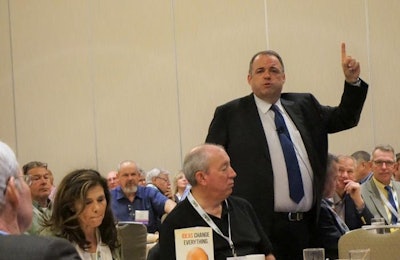
The key to a successful, vital business is maintaining a founder’s mindset, an insurgent attitude and an obsession with staying on the front line.
That’s what Damien McLoughlin, Anthony C. Cunningham professor of marketing and associate dean at University College Dublin’s Michael Smurfit Graduate Business School, told an audience at the National Turkey Federation’s Annual Meeting in San Diego. McLoughlin shared anecdotes and case studies about some of the world’s most successful companies and entrepreneurs and identified the common characteristics that helped make them great.
As part of his remarks, he gave specific guidance on how the U.S. turkey industry can adopt some of these concepts to help grow demand in the near future.
1. Play to win
Rather than playing to win, McLoughlin argued the turkey business is playing not to lose. He pointed to an advertising campaign aiming to dispel myths about the turkey industry – which for a time around Thanksgiving 2017 was displayed in New York City’s Times Square – and said no one really cares about myths surrounding turkey except for the industry itself. Talking about it only draws attention to those myths and gets people thinking about things like antibiotics and industrial farming when they otherwise wouldn’t.
This is wrong because it puts the industry on the defense from the outset. It’s playing not to lose. What the industry needs to do is talk about what it’s doing right. Turkey, he said, is a great, clean protein, produced by families in the U.S. That’s a positive story people want to hear and need to hear.
In a similar vein, he pointed to the tactics of animal activists groups. They question the hanging and stunning of turkeys and break into barns, and sometimes steal animals, in an attempt to tell a negative story about animal agriculture. The best way to play to win against the activists, he said, is to follow the example of two companies leading the way in supply chain sustainability: McDonalds Corp. and Walmart Inc.
“These guys play to win in this space. They are not complaining about people breaking into their barns,” McLoughlin said. “What they are saying is, ‘Break into our barns anytime you want, dude, because there’s nothing going on here that we’re embarrassed about.’”
2. Remain insurgent and on the front line
Turkey sales are flat or declining in mature markets like the United Kingdom or France, McLoughlin said. How is this happening in an era when protein is at the center of nutrition and health buzz and in growing demand as the world’s middle class grows?
By comparison, plant-based proteins and dairy proteins are gaining traction as the only so-called clean proteins – he said – because of an owner’s mindset in those businesses. Plant-based products, for example, are attractive to consumers because of relentless marketing efforts by companies with an insurgent attitude and a front-line obsession.
The response the industry is attempting – incremental innovation in growing ground turkey, food formats and food service chains – is not sufficient to these systemic problems, he argued. Instead, the industry needs to get back to an insurgent, founder’s mindset. It must re-focus on what company founders worry about: providing a great product and beating out the competition.
3. Think like a visionary instead of a bureaucrat
The turkey industry, due to its size and success, is full of incumbents. The biggest companies in the business are successful because they’re already big. If someone wants to buy turkey protein at scale, they must do business with that select group of top companies.
“Something strange happens, they start to rely on the benefits of being really big. Usually this happens because the leader is not a scalable leader, usually this happens because the voice of the customer becomes less and less in the organization,” McLoughlin said. “Eventually you become this incumbent that’s so large where actually if you want to do business in the industry you have to do business with them but over time forces actually push them down to be struggling bureaucracies.”
In the food industry, there’s no shortage of struggling bureaucracies. Top international food brands like Nestlé S.A., Kellogg Co. and The Coca-Cola Co. are dealing with declining sales and shrinking global influence.
The way to avoid falling into this category is to start thinking like a visionary. Just because someone isn’t the company founder, or isn’t the company’s leader even, doesn’t mean they are prohibited from thinking like a visionary focused on something larger than themselves. Everyone in the organization, from top to bottom, should be encouraged to be visionary and act like they are founders of their own business.
Examples of success
McLoughlin gave examples of two older, incumbent companies with successful turnarounds led by visionary, insurgent outsiders. The ideas weren’t necessarily revolutionary, but rather a return to the basics.
Tesco PLC, a leading grocery and general merchandise retailer in Europe and Asia, saw a turn around when it brought in a new leader, Dave Lewis, in 2014. Lewis attacked incumbency by immediately firing a large chunk of management. He reignited the insurgent tendencies by getting back to the core business of piling high and selling cheap, or competing based on price. Results were positive, McLoughlin said.
McDonalds, the global restaurant chain, promoted Steve Easterbrook to chief executive officer in 2015. McLoughlin said the new CEO was able to renew the front-line obsession. Under Easterbook’s leadership the company focused on what it’s good at and known for: selling hamburgers, fries and milkshakes. By rediscovering lost practices, as well renewing its recipes and renovating its restaurants through franchisees, the company is resurgent.


















